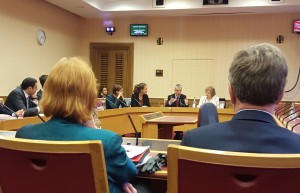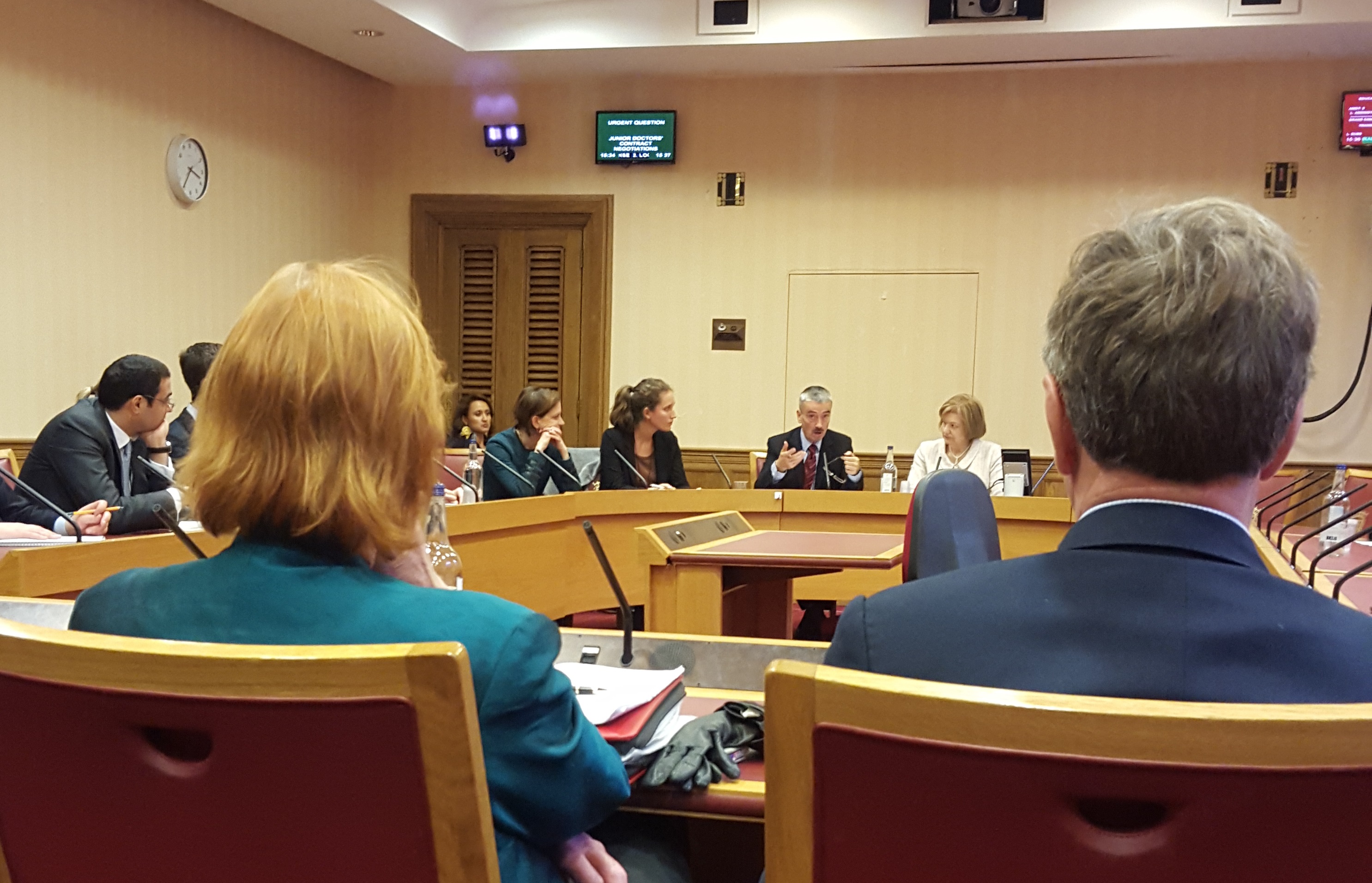By Sami Zaptia.

London, 8 February 2016:
British ambassador to Libya Peter Millett said that Libyans need to learn the culture of political . . .[restrict]compromise referring to the vexing issue of Khalifa Hafter in the political tug-of-war taking place currently within the Presidential Council.
He believed that Khalifa Hafter, appointed Chief of Staff by the Tobruk House of Representatives (HoR) could be installed as ‘’part of the security hierarchy’’ but ‘’with his role diluted’ which could be a compromise solution acceptable to both the east and west.
Millett was speaking on Monday at the All Party Parliamentary Group on Foreign Affairs Co-Chaired by Khalid Mahmood MP and Baroness Nicholson of Winterbourne at the House of Lords. Libya Herald was present at the meeting.
The Libyan Presidential Council is born out of the Libyan Political Agreement signed between the contending Libyan political factions in the Moroccan city of Skhirat. It has now moved from Tunis to Skhirat in an attempt to force itself into nominating a government within the deadline set by the Skhirat agreement.
Millett did not think that the LPA could be opened to renegotiation. It would be ‘’opening a Pandora’s box’’ he said, if it were to be reopened. He believed the LPA structure was good.
The proliferation of Libyan militias which are – uniquely in the world – funded by the Central Bank of Libya is a continuing challenge admitted Millett. How to mould them into a centralized state army and wean them off state supplied salaries is a challenge, he admitted.
Regarding the Libyan economy, Millett said that there is a ‘’misperception that Libya is rich’’.’’ It has the potential to be rich’’ he explained but with the current international crude oil prices, Libya’s low rate of oil production, its foreign currency reserve depletion, its price rises and loss of value in its dinar: ‘’Libya is on the brink of going bankrupt’’.
Millett still believed that ‘’the east’’ (the only internationally recognized parliament and government since the elections of 2014) are still trying to ‘’ship oil’’ but that the ‘’oil industry’’ were so far not prepared to buy from them.
On the humanitarian front Millett said Libya has about 450,000 internally displaced and needs about US$ 160 million in aid. Put in context, he said that would usually be about one week’s worth of Libyan oil production. Donors were still having a problem with accepting that Libya is not rich, he added.
On the current attempt by the Presidential Council to nominate its reduced government, Millett felt confident that if a meritocratic government is put forward, the Tobruk-based House of Representative would approve it.
The British ambassador, currently based in Tunis, admitted that it was ‘’an open question’’ if the GNA will be able to take its place in the capital Tripoli. Adding that it would ‘’lose credibility’’ if it failed to do so. ‘’If the (GNA) government does not go to Tripoli it will not have much credibility ‘’
He also admitted that it was an ‘’open question’’ as to whether the militias in Tripoli will comply with the LPA in welcoming and accepting the GNA into Tripoli.
With regards to the vexing issue of sanctions against the so-called ‘’spoilers’’ of the LPA, Millett felt that imposing these at either the EU or the UN level were possible.
He went as far as to suggest that both GNC president Nuri Abu Sahmain and Tripoli Salvation Government head Ghwell were leading contenders for possible sanctions in view of their repeated refusals to allow UNSMIL to land in the Tripoli area.
He did not elaborate on the type of sanctions being considered nor any other possible sanctions targets. However, he interestingly said that he felt that talk of possible sanctions against individuals has in his view possibly already led some potential spoilers into getting into line.
Millett denied categorically that the British government is considering the creation of a Baghdad-like Green Zone within Tripoli nor the possibility that there would be any ‘’British boots on the ground’’. He did say that the British government would, if requested, provide training.
The Ambassador stressed that it was important to distinguish between dealing with IS/Daesh in Libya with dealing with the security situation for the GNA. He refuted the question put to him that the British government only wanted the GNA so that it could invited into Libya to fight IS/Daesh. Britain wanted to help Libya on many levels he said.
Ambassador Millett admitted that there were some ‘’lessons learnt’’ (diplomatic speak for mistakes committed) in Libya, including the fact that the previous Libyan administrations may have been ‘’swamped’’ by the amount of help they were offered. They could not cope, he explained.
Equally, he would advise that only experts who spoke Arabic be placed in Libya.
In view of ‘’lessons learnt’’ he had referred to, Libya Herald asked the ambassador since the militias were the basis for the failure of Libya’s democracy and in view of them being financed by the CBL, had the international community considered some outside the box policies for Demilitarization, Demobilization and Reintegration (DDR)? Had the international community thought of some smart ‘’carrots and sticks’’ to get out of the same loop.
Millett said that he was surprised how often he was asked a question about DDR at the meeting. He also surprised some of the audience by saying that he though DDR was ‘’not an immediate priority’’.
He felt that DDR was most challenging and did not see how in the immediate term it could be implemented
On the question why was the CBL continuing to pay the salaries of the militias, Millett said that he was informed that they literally ‘’held a gun to the head’’ of an official forcing them to pay.
Libya needed ‘’a medium to long term plan of weaning the militias off the state salaries’’, Millett said, but offered no concrete policies beyond the ‘’hope that somehow they (militias) would be weaned off’’. This was a ‘’most challenging’’ issue he admitted.
However, he revealed that a DDR policy expert was being offered to the GNA to give options of DDR policy
To a question regarding the international community putting pressure on regional states (most commonly believed to be Qatar, Turkey, UAE and Egypt) supplying arms to either side, Millett pointed out that there was an arms sale embargo in place. He was sure that it was being broken but had no evidence of this to act upon.
Moreover, he believed that as of the December 2015 Rome meeting on Libya, all parties were now in support of the Skhirat LPA. [/restrict]








